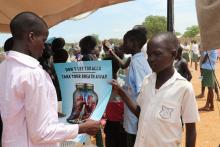Choose health not tobacco: South Sudan marks the World No Tobacco Day
1 June 2019, Juba – ‘I got hooked on cigarettes at the age of 16 and smoked for 30 years. During these years, I tried intermittently to stop without much success due to the very addictive nature of nicotine. In August, 2016, my 11-year-old daughter approached me and said “Daddy, I want you to attend my graduation ceremonies, wedding and many more celebrations. It will not happen if you do not stop smoking!” The harsh reality of this statement was all the motivation I needed to stop this horrible habit. Ten months on, the journey has been difficult but the longer I stay off, the easier it gets, says John Lasuba.
There are many young people like Lasuba in South Sudan, who have been hooked to tobacco use in a similar way but have not been fortunate to quit. Tobacco consumption is one of the major public health threats the world has ever faced, but it can be prevented. Reducing tobacco use and second-hand tobacco smoke exposure is the most effective way to improve lung health and other devastative health effects of tobacco.
On 31 May 2019, the Ministry of Health, Republic of South Sudan with support from the World Health Organization and other partners marked the World No-Tobacco Day with a week-long campaign including interschool football match, schools debate, media programs and a public rally under the theme “Tobacco and Lung Health” reaching over 5000 people. This provided a platform for advocacy and awareness creation highlighting the negative impact that tobacco use on people’s health, tips on what can be done to reduce the tobacco-related risks hence empowering people to make informed choices.
The campaign also served as a call to action, advocating for effective policies to reduce tobacco consumption and engaging stakeholders across multiple sectors in the fight for tobacco control.
South Sudan in-line with the provisions of the WHO’s Framework convention on Tobacco control, has instituted measures to reduce tobacco use. These among others include increasing taxes on tobacco products up to 250% with an aim of making tobacco unaffordable especially by the young people said Dr Pinyi Nyimol Mawien , Director General Preventive Health Services at the Ministry of Health.
Dr Matshidiso Moeti the WHO Regional Director for Africa in her statement read by Dr Moses Mutebi on behalf of the WHO Country Representative during the public rally said ‘We need to embrace the proven health benefits of stopping tobacco use as well as the feasible actions that the public and governments can take to reduce the risks to lung health posed by tobacco’. She urged governments to adopt and enforce tobacco-control policies aimed at reducing the demand for tobacco; promoting tobacco cessation; and adequately treating tobacco dependence. Dr Moeti noted that this should encompass educational institutions, health care facilities, workplaces and sporting environments.
The statement further called upon Member States to respond to the tobacco epidemic by fully implementing the provisions of the World Health Organization’s Framework Convention on Tobacco Control. Treatment of tobacco dependence should be part of a comprehensive tobacco control policy along with the establishment of smoke-free public places, health warnings on tobacco packages and a ban of tobacco advertising. In addition to an individual approach, including behavioural and/or pharmacological interventions, a supportive environment is needed to encourage tobacco consumers to quit.
Dr Moeti reaffirmed WHO’s continued commitment to promote and strengthen awareness of the benefits of tobacco-free lifestyles and the cessation of tobacco use.
Note to editors
Tobacco is the only product if used as advised by its manufacturers kills up to half of its users. It is the only behavioral risk factor common to the four main non-communicable diseases (cardiovascular disease, cancer, diabetes and chronic respiratory disease) that now account for more deaths globally than all other causes combined. Tobacco is also co-morbid with tuberculosis and HIV, two of the major infectious diseases with which developing countries still grapple as they confront fast-rising NCD burdens.
Email: moggaj [at] who.int
Communication Officer (Health Promotion/Risk Communication focal person)
Mobile: +211 (0) 921647860
Email: luwagal [at] who.int







